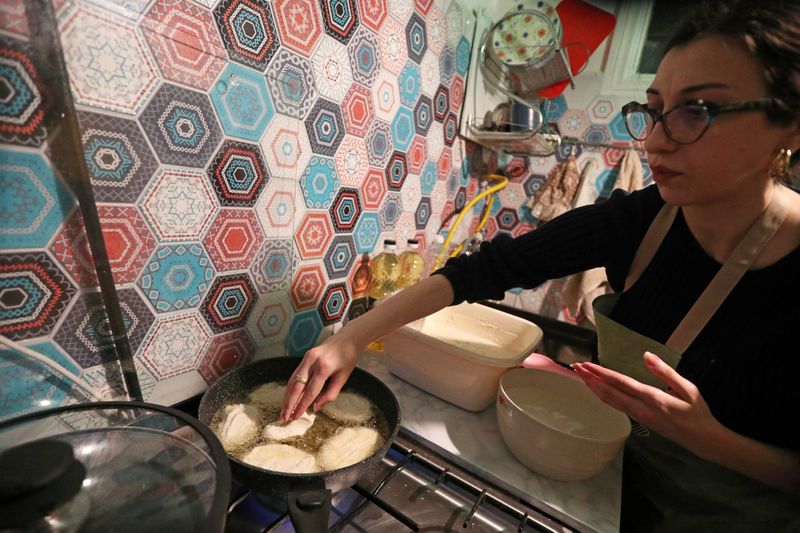By Felix Mild
TBILISI (Reuters) – Nearly each night time since pro-EU protests erupted in Georgia final week, younger husband-and-wife duo Mamuka Matkava and Gogona Parkaia have been working flat out to feed their fellow demonstrators.
Every night time the couple, one a musician and the opposite an artist, spend three to 4 hours cooking dozens of mchadi, a standard cornbread native to their residence area of Mingrelia in western Georgia, of their small flat in a quiet residential neighbourhood of the capital Tbilisi.
Including to every piece a slice of salty Georgian sulguni cheese, they dish out the snacks to protesters gathered on Tbilisi’s central Rustaveli Avenue, the epicentre of the protests. Many protesters keep out till morning amid prolonged standoffs with riot police armed with water cannon and tear fuel.
The South Caucasus nation of three.7 million has been gripped by disaster because the Georgian Dream get together, returned to energy in an October election the opposition says was tainted by fraud, mentioned final week it was halting European Union accession talks till 2028, abruptly freezing a long-standing nationwide aim of EU membership that’s written into Georgia’s structure.
Georgian Dream says the protests signify an try and stage a violent revolution by pro-EU opposition events.
Like many younger Georgians, Gogona sees the query of EU membership as existential for her nation, which gained independence on the Soviet Union’s break-up in 1991, however has below Georgian Dream deepened ties with Russia, which continues to assist two breakaway Georgian areas.
“The most important thing is that we need to avoid becoming part of Russia,” she mentioned.
“We need a friend who can protect us from the power of Russia, you know? Because we are a very small country, and by ourselves, we cannot do anything.”
For Gogona, who runs a YouTube channel with husband Mamuka, there may be an added accountability. She is pregnant, and says that serving to feed protesters permits her to take a stand with out risking her unborn baby at protests that always flip violent, and at which over 300 folks have been detained.
“I don’t just feel responsible for myself right now. I feel responsible for my child,” she mentioned.
GENERATION GAP
Youthful Georgians have been quite a few at pro-EU rallies which have flared up periodically because the spring, when Georgian Dream launched a regulation on “foreign agents” that home and international critics say is draconian and Russian-inspired.
In distinction to their elders, few youthful Georgians have visited Russia, or communicate its language, having grown up in a interval when Moscow imposed a stringent visa regime on Georgians that was solely lifted final 12 months.
Born and raised in a rustic the place EU and Georgian flags fly collectively exterior authorities buildings, and having fun with visa-free journey to the EU’s Schengen Zone, Georgia’s Technology Z have a tendency in direction of pro-Western views.
They see the present protests as a seminal second within the historical past of Georgia, which was dominated from Russia for round 200 years, and fought and misplaced a quick conflict with its large neighbour in 2008.
Twenty-year-old politics pupil Nini got here to Wednesday night time’s protest with classmates from certainly one of Tbilisi’s personal universities, most of which have suspended research amid mass pupil walk-outs.
Like many rally-goers, she carried a fuel masks slung round her neck in case of a police crackdown.
She mentioned: “As a student, and as a Georgian, just a citizen, I feel like it’s my obligation to stand with my people, with my fellow Georgians when there is such a critical situation in our country.”
Nini mentioned that her friends, who grew up on-line and sometimes communicate fluent English, took their pro-Western cues from their dad and mom’ and grandparents’ bitter experiences of Georgia’s turbulent historical past since independence.
“We don’t want to go back into the past. We’re not going back.”
For expectant mom Gogona, her unborn baby solely provides to the importance of the present second.

“We don’t want our children to have to protest in their life. We want them to have freedom and the opportunity to choose their own way,” she mentioned.
“We just want them to be in a free country, you know?”




